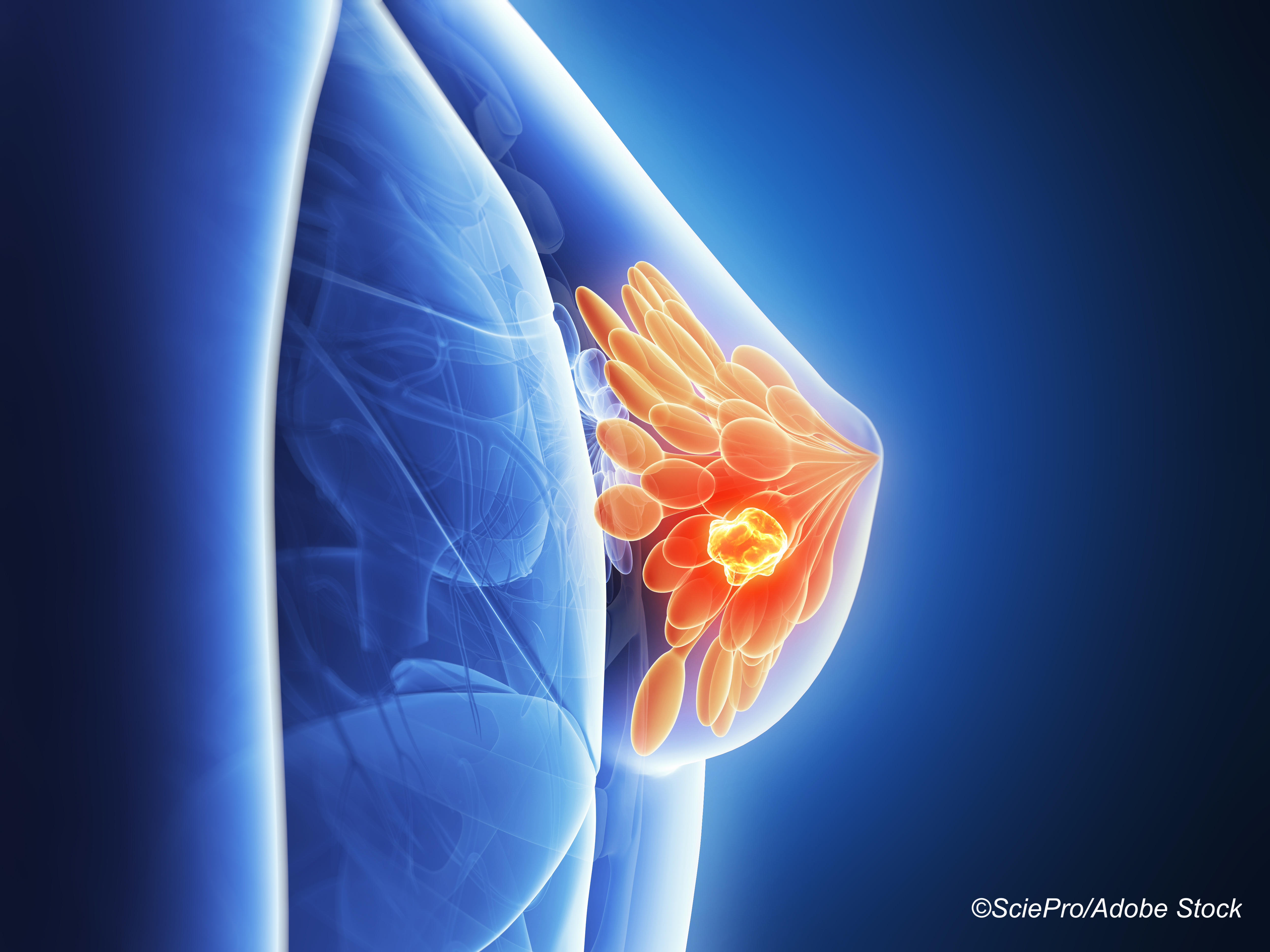The addition of the first-in-class cyclin-dependent kinase 4 and 6 (CDK4/6) inhibitor, palbociclib to standard adjuvant endocrine therapy disappointingly had no clinical benefit over endocrine therapy alone in women with early hormone receptor-positive (HR+) breast cancer, the final results of the randomized, phase III, Palbociclib Collaborative Adjuvant Study (PALLAS) has shown.
At a median follow-up of 31 months, rates of invasive disease-free survival (iDFS)—the primary endpoint of the study—were virtually identical in the two arms at 8.8% in patients who received additional palbociclib versus 9.1% in patients who received endocrine therapy alone, Michael Gnant, MD, Medical University of Vienna, Vienna, Austria, and co-investigators reported in the Journal of Clinical Oncology.
The publication of PALLAS was timed to coincide with its presentation at the 2021 San Antonio Breast Cancer Symposium (SABCS).
Similar results between the two treatment groups were observed at four years, with 84.2% of palbociclib plus endocrine therapy patients still being free of invasive disease compared with 84.5% of patients on endocrine therapy alone at a hazard ratio (HR) of 0.96 (95% CI, 0.81-1.14; P=0.65), investigators add.
No significant differences were observed for secondary time-to-event endpoints either and there were no differences in iDFS between the two treatment groups on any subgroup analysis.
“In PALLAS, the palbociclib benefits previously observed in the metastatic setting did not translate into the earlier adjuvant setting,” Gnant noted in a statement about the results.
“[But t]he lack of adjuvant palbociclib efficacy does not preclude further integration of CDK4/6i into the breast cancer treatment algorithm,” he and the study authors suggested.
PALLAS was a truly global study involving a total of 5,796 patients, carried out by 406 centers in 21 countries on five continents.
Patients had stage II or III HR+ breast cancer and had completed definitive surgery and neoadjuvant chemotherapy plus or minus radiotherapy if indicated prior to randomization.
Patients received either two years of palbociclib at a dose of 125 mg, orally, once a day on days 1 to 21 of a 28-day cycle along with at least five years of adjuvant endocrine therapy or adjuvant endocrine therapy alone.
Secondary endpoints included invasive breast cancer-free survival, distant recurrence-free survival, locoregional cancer-free survival, and overall survival.
At four years, rates of each of these secondary endpoints were again virtually identical in both the additional palbociclib and endocrine therapy alone arms:
- Invasive breast cancer-free survival: 85.4% versus 86.0%.
- Distant recurrence-free survival: 86.2% versus 87.8%.
- Locoregional cancer-free survival: 96.8% versus 95.4%.
- Overall survival: 93.8% versus 95.2%.
The majority of first distant recurrences in both arms occurred in nonvisceral locations, particularly in bone, the authors noted.
In the additional palbociclib arm, over half of patients at 55.2% (95% CI, 53.3-57%) required a dose reduction to 100 mg a day over the treatment interval while slightly over one-third of patients (95% CI, 31.7-35.1%) required a dose reduction to 75 mg a day.
“Furthermore, cumulative incidence of early palbociclib discontinuations was 44.9%,” Gnant and colleagues note.
Despite that, “we undertook a landmark analysis that shows that even in patients who received most of or the full two years of tamoxifen, there was no significant palbociclib benefit,” Gnant told BreakingMED in an email. “Drug exposure is not the reason why this does not work.”
There were also no new safety signals with respect to palbociclib treatment overall, investigators added, with serious adverse events (AEs) reported in 13% of the combination arm compared with 7.9% in the endocrine therapy alone arm.
The most common AEs among patients in the combination arm were neutropenia at 83.5%; leucopenia at 55.1%, and fatigue at 41%, all of which were significantly less common among patients who received endocrine therapy alone at 5%, 7.5% and19.3%, respectively.
As Gnant explained, the reason why palbociclib was not effective in the adjuvant as opposed to the metastatic setting may be fairly straightforward.
“The target of CDK4/6 inhibition in metastatic disease is metastases, with millions of proliferating cells,” he noted. “And one can easily imagine that putting a ’Stop Sign’ to them—this is what CDK4/6 inhibitors do in essence—is effective.”
In contrast, in early breast cancer, the target is either dormant or “awakening” tumor cells. A “Stop Sign” in that setting may simply not work as well, Gnant explained.
“[T]ranslational science will help to better understand unique tissue and/or serum biomarkers that may predict individual benefit or resistance for each of the approved CDK4/6 inhibitors to guide optimal patient selection and treatment combinations,” the study authors suggested, and noted that the large biorepository containing both tumor tissue and serial plasma samples from the PALLAS cohort will facilitate this important research.
Commenting on the findings, ASCO spokesperson, Timothy Moynihan, MD, who is also affiliated with the Mayo Clinic in Rochester, Minnesota, noted that it was not really clear why no benefit from palbociclib was seen.
“Preventing recurrence is a lot different from treating established disease,” he told BreakingMED in an email.
“Remember that the vast majority of these patients will never have a recurrence so the numbers of people who will recurrence is fortunately very small and that may hide some small benefit,” Moynihan stressed, and added that what comes next in the treatment of early HR+ breast cancer remains uncertain.
-
The first-in-class CDK4/6 inhibitor, palbociclib, had no clinical benefit when added to endocrine therapy over endocrine therapy alone in early HR+ breast cancer.
-
The lack of clinical utility of palbociclib in the adjuvant setting still does not preclude the use of CDK4/6 inhibitors in the breast cancer treatment algorithm.
Pam Harrison, Contributing Writer, BreakingMED™
The trial was funded by Pfizer.
Moynihan disclosed no relevant relationships.
Gnant reports being employed by Sandoz and has received honoraria from Amgen, Novartis, AstraZeneca and Lilly. He has also served as a consultant or in an advisory role for Daiichi Sankyo, Veracyte, Tolmar, LifeBrain and Lilly.
Cat ID: 22
Topic ID: 78,22,730,22,691,192,925




Create Post
Twitter/X Preview
Logout